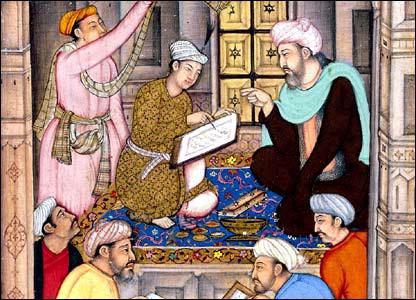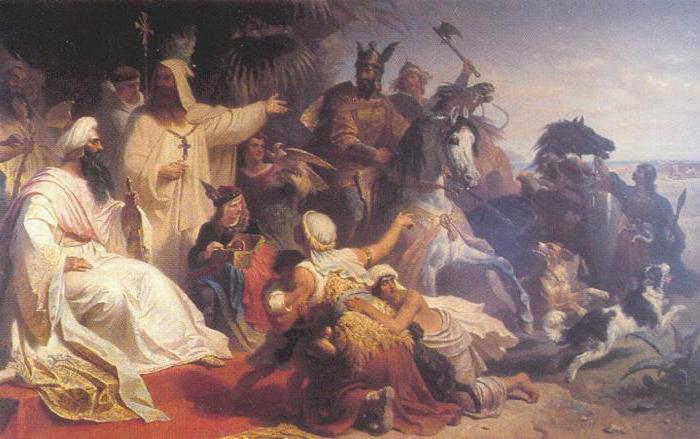The second half of the 8th century AD was marked by the weakening of central authority, and the remote areas of the Caliphate received a new impetus for development. Against the backdrop of general changes, Baghdad stood out. Quite quickly, he turned into the cultural and political capital of a huge Muslim empire. In a rapidly developing city, a merchant, architect, soldier - anyone could find a job. And especially successful ones could make a successful career and become close to the caliph, whose name was Harun ar-Rashid.
Tales and Reality
Arabian tales present us with the ruler of Baghdad as a just and wise patron of architects and scientists, philanthropist and creator. The image of Harun-ar-Rashid turned out to be so impressive that subsequently his name became a household name, designating a generous person, endowed with power, kind and fair. But reality, as always, turned out to be much more prosaic than magical traditions.
Caliph's childhood
In the ancient city of Rei, which is located near Tehran, in 766 the grandson of the great Al-Mansur, the founder of the Abbasid dynasty, who for a long time ruled a huge caliphate, was born. Their possessions extended from the borders of India and China to the shores of the Atlantic Ocean. Grandfather Haruna ar-Rashid founded Baghdad. The latter at the time of the birth of the future caliph became a rich and flourishing city, the main decoration of which was the palace of the caliph. The mother of the future khan was a Yemeni slave named Al-Khayzuran, whom the caliph made his concubine, and afterwards married her.
Harun al-Rashid spent his childhood in bliss and luxury, surrounded by friends, relatives and wise mentors. Despite the surrounding wealth, he grew up strong and hardy - perfectly shot from a bow, wielded a sword, was a great rider. From early childhood, his mentors were representatives of a noble family of Barmakids, and the young Jafar ar Barmakid for many years was his best friend.
The first military campaigns
At the request of Harun's mother, at a young age of sixteen, the son of the Caliph took part in a military campaign against Byzantium. It is clear that he commanded the troops purely nominally, all the military operations were conducted by more experienced military leaders. Despite the many libels that whispered in his father’s ear, the opponents of Harun al-Rashid were put to shame. The young heir showed outstanding courage and ingenuity in the battles, and he could be entrusted with more complex matters.
After returning from campaigns, Harun ar-Rashid was assigned to rule Ifricia (now this land is located in the territory of modern Tunisia), Armenia, Azerbaijan and Syria. In the list of candidates for the Caliph throne, he was second after his half-brother Musa.
Al-Hadi Short Reign
After the death of the caliph, Musa took the throne under the name al Hadi. He threw his brother into prison and made an oath that Harun al-Rashid would never claim the throne and would faithfully serve his brother ruler.
But Haruna’s mother and his friend Jafar didn’t take such an oath. Al-Hadi reigned in his caliphate for a short time. In 786, he suddenly died, and Harun took his place.
The goals of Harun al-Rashid
The struggle for the throne in any empire is a long-term and bloody confrontation. Having ascended the throne, young Harun first of all continued to play a nominal role, and his teachers and powerful Barmakids ruled the country. In his judgments, the young caliph was guided by the instructions of his teacher Yahya ibn Khalid, he devoted a lot of time to his mother, who elevated him to the throne.

After the death of his mother, Harun al-Rashid gradually gets rid of the influence of the powerful Barmakid clan and takes over the reins of power. The main opponents of Harun al-Rashid are now his former friends and mentors. On January 29, 803, Jafar, a long-standing and most loyal friend of the Caliph, dies at the hands of his vizier. Whether the denunciation of the anonymous ill-wisher was the fault, or the suspicion of the caliph was to blame, we will never know the truth. The caliph’s teachers were also removed from the leadership, and his mentor Yahya ibn Khalif was imprisoned for a long time.
Caliph's policy
The reign of Harun al-Rashid can be safely called the golden age of the caliphate. Unconditional military superiority discouraged the poor neighbors to profit from raids on the outskirts of the empire. All attempts to rekindle the flames of war were ruthlessly suppressed. In this relatively peaceful time, trade is booming. Perhaps it was the Arab merchants who traded with all of Oecumene who carried the news of the new Caliph as a generous and wise ruler.
Despite his glory as a formidable ruler and a stern military leader, Harun ar-Rashid was sensitive to the voice of scientists and merciful to the poor. Throughout his reign, he prayed daily. The doors were always open for theologians and poets; Harun often listened to them, allowed them to interpret the Qur'an, and to sing laudatory songs in their own address.
Advances in Science and Construction
Despite the general rule, in the Abyssinian caliphate, the cities had relative independence. The Caliph followed the successes of scientists from various lands of his caliphate, and invited the most talented researchers and architects. Thanks to this approach, what achievements Harun al-Rashid became famous for, the whole Arab world soon learned . Bridges and mosques were erected in the caliphate, dams and dams were built to irrigate the dry boundless lands of the caliphate.
A central postal service appeared, which was not even heard of in Europe at that time. Caravan routes on the territory of the caliphate were guarded from robbers, travelers stayed at inns, not fearing for their lives and savings.
Great project
It is interesting that, according to one historian, Harun al-Rashid seriously considered projects to connect the Red Sea with the waters of the Romeysky (Mediterranean). The caliph had both means and opportunities to carry out this undertaking. This project was rejected for reasons of state security - the Caliph commanders seriously feared the invasion of Byzantine ships and their breakthrough to the shores of Hejaz. They returned to this idea more than a thousand years later, having built the Suez Canal on the site of the ancient project .
Caliph's wife
Soon the young caliph got married. His chosen one was Zubeidda ibn Jafar, the granddaughter of the Caliph al Mansur. Many of Harun al-Rashid's achievements must rightfully be attributed to this particular woman. He made a huge contribution to the improvement of cities, from its filing in the streets of Baghdad at night the lights shone, she was one of the first wives to engage in charity. She gave her husband and lord son Abu Abdullah al Allah, who at one time became the heir to her father’s empire.
Caliph and religion
The kindness and piety of the ruler was strangely combined with his intransigence towards the Gentiles. At the dawn of his reign, he announced an amnesty, having pardoned hundreds of robbers and thieves, but leaving people in prison, whose interpretation of the Koran was different from the generally accepted one. In the Christian world, such people would be called heretics. The so-called Zindiki were supposed to publicly abandon the wrong teachings and make a certain bribe for their release.

Gentiles were subjected to humiliation in the caliphate and had to obey more stringent rules. For example, they were forbidden to wear the same shoes that Muslims wore. They were not allowed to ride horses - donkeys were considered the main means of transportation for Christians and other Gentiles. Supporters of other religions did not enjoy the support of the caliphate. In 806, Harun al-Rashid, in a pious zeal to make Islam the only religion on his land, ordered the destruction of all Christian shrines in his lands, effectively prohibiting the practice of Christianity in his caliphate.
The last days of the caliph
The aggressive policy of imposing Islam eventually shook the serene reign of the Abbad Caliphate. Various movements of the Muslim religion found their supporters on the outskirts of the great empire. Revolts broke out in Egypt, Tunisia and Central Asia. Numerous wars devastated the treasury and demanded the immediate attention of the ruler. The Caliph often had to single-handedly lead military campaigns. At the time of Harun's return from one such campaign, in 809, he was overtaken by death. It is said that the last words of the caliph were: "Immortal, forgive the mortal."